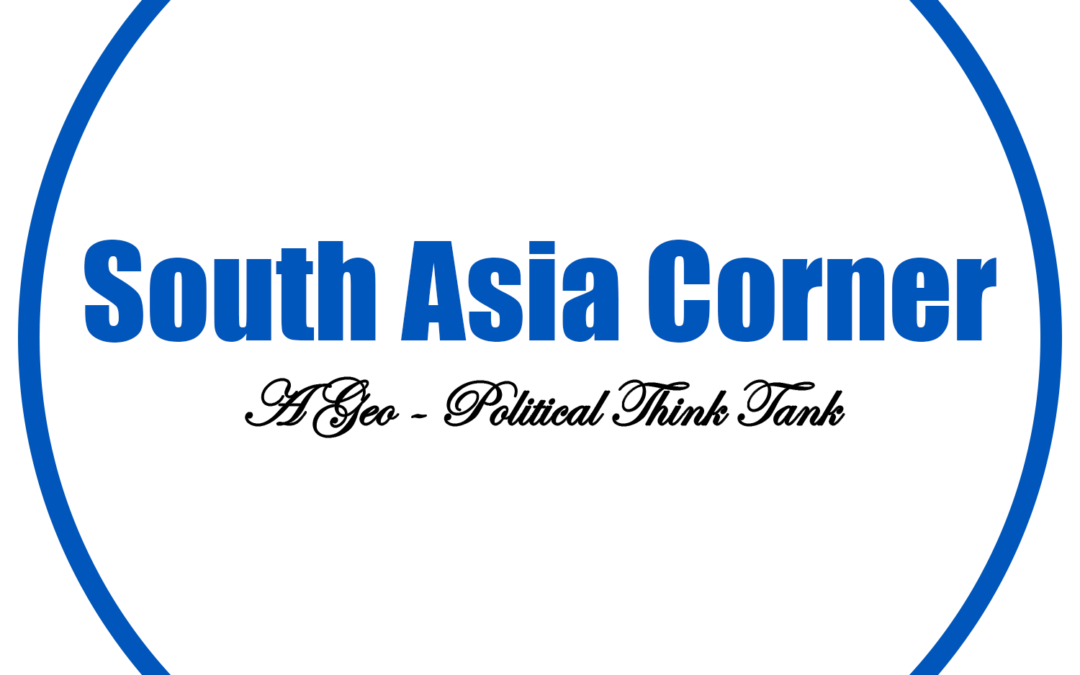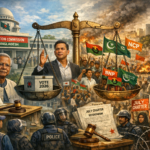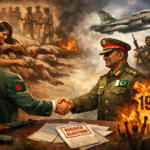Introduction
Pakistan, a country formed following India’s split in 1947, has faced a tangle of political, military, and sociological obstacles. This essay digs at Pakistan’s varied difficulties during the last 75 years. These include the military’s continued dominance, the predominance of authoritarian governments, the limitations of democratic systems, and the thorny topic of Pakistan’s affiliation with terrorist organisations. Furthermore, it examines the role of ineffectual politicians in worsening these challenges, focusing on the impact on the lives of the country’s 240 million residents, who frequently find their voices marginalised amid sectarian warfare.
The Military’s Pervasive Presence
Without a doubt, the military’s omnipresence in Pakistan’s political arena is a permanent element of the country’s history. The military has been involved in politics since Pakistan’s inception, with periodic interventions, coups, and even total takeovers of the government. Regardless of the civilian face of government, the military acts as a “deep state,” holding significant power behind the scenes. The military’s ubiquitous political role impedes the building of a strong and stable democracy.
Dictators and their Roles
A series of military dictators have ruled Pakistan, with some of the most prominent names being Ayub Khan, Zia-ul-Haq, and Pervez Musharraf. These autocratic leaders have left an indelible mark on Pakistan’s political history. While some have argued that these dictators brought economic stability or claimed to “cleanse” the political system, their authoritarian rule stifled democratic growth and undermined the rule of law. These regimes often suppressed dissent, curtailed civil liberties, and perpetuated a culture of political repression.
Failed Democracy
Pakistan has witnessed multiple attempts at democratic governance, but interruptions and power struggles have marred the path to a stable democratic system. Elected governments have struggled to complete their tenures, with periods of political chaos and instability being the norm rather than the exception. The inherent weakness of democratic institutions, combined with military interference and a lack of accountability, has contributed to the failure of democracy in Pakistan. The constant tussle between civilian governments and the military further erodes the prospects for a genuinely functional democratic system.
Colluding and harbouring terrorist organisations
One of the most contentious issues associated with Pakistan is its alleged role in colluding with and harbouring terrorist organisations. Pakistan’s tribal regions, particularly along the Afghan border, have served as safe havens for extremist groups. The support provided to the Afghan Taliban and other militant outfits has been a significant point of contention internationally. This collusion not only threatens regional stability but also poses a significant security risk to Pakistan itself.
Pakistan’s inconsistent stance on terrorism is a double-edged sword. While some argue that Pakistan has been a victim of terrorism, others claim that its security apparatus has maintained ties with select extremist groups for geopolitical purposes. This complicated relationship with terrorism has made it difficult for the international community to wholly trust Pakistan’s commitment to counter-terrorism efforts.
Inept Politicians
While military dominance and dictators have played a significant role in Pakistan’s political turmoil, the ineptitude of many civilian politicians cannot be overlooked. Corruption, nepotism, and a lack of vision have plagued the political landscape. Elected officials often prioritise personal gain over the population’s welfare, eroding public trust in the democratic process. The inability of politicians to work together and address the pressing issues facing Pakistan has contributed to the ongoing crisis.
Impact on 240 Million Pakistanis
Pakistan’s 240 million citizens acutely feel the repercussions of these multifaceted challenges. Political instability and economic uncertainty have hindered the country’s development, leaving a substantial portion of the population impoverished. The lack of access to quality education, healthcare, and basic infrastructure has impeded the prospects of millions. Additionally, the sectarian troubles and ethnic conflicts in Pakistan have led to a loss of life and deepened divisions within the country.
The Sudden Return of Nawaz Sharif: A Harbinger of Pakistan’s Challenges
Amid Pakistan’s turbulent political landscape, the sudden return of Nawaz Sharif, the former prime minister who has faced numerous jail sentences for allegations of corruption and various irregularities, is a poignant reminder of the country’s persistent struggles. Sharif’s tumultuous political career reflects Pakistan’s struggles with accountability, governance, and the rule of law. His return to the forefront of Pakistani politics underscores the nation’s failure to learn from its past shortcomings and idiosyncrasies.
Nawaz Sharif, a prominent figure in Pakistan’s political arena, served as the Prime Minister on three occasions: 1990–1993, 1997–1998, and 2013–2017. His stints in power were marred by allegations of corruption and mismanagement, with various controversies surrounding his tenure. The Panama Papers leak in 2016 exposed offshore assets linked to his family, intensifying concerns about financial improprieties.
Sharif’s tenure as Prime Minister in 2017 ended abruptly when the Supreme Court of Pakistan disqualified him from office for not disclosing his assets. Subsequently, he was convicted in a corruption case, leading to his imprisonment. His sudden departure from Pakistan, ostensibly for medical treatment in London, raised questions about the impartiality and effectiveness of Pakistan’s judicial system.
Despite ongoing legal proceedings and the prison sentence hanging over him, Nawaz Sharif’s recent return to Pakistan highlights several critical issues within Pakistan’s political and legal landscape.
- Selective Accountability: Sharif’s return underscores Pakistan’s perception of demanding accountability. Critics argue that Pakistan’s judicial system has been inconsistent in pursuing cases of corruption and irregularities. The perception that some political figures evade responsibility while others face prosecution erodes public trust in the rule of law.
- Political Manoeuvring: Sharif’s return also points to Pakistani politics’ ongoing political manoeuvring. Despite the legal cases against him, his decision to return was seen by many as an attempt to rejuvenate his political career and reestablish his party, the Pakistan Muslim League (Nawaz), as a formidable force.
- Fragile Democracy: The presence of a prominent figure like Sharif, with allegations of corruption and mismanagement, challenges the fragile democratic institutions in Pakistan. The inability to effectively address corruption allegations and enforce accountability mechanisms is a recurring issue that hampers the growth of a robust democracy.
- Military and Civil-Military Relations: The military’s role in shaping Pakistan’s political landscape cannot be ignored. Some observers have speculated on whether Sharif’s return is part of a broader power play involving the military, adding another layer of complexity to civil-military relations.
Nawaz Sharif’s sudden return to Pakistan is a stark reminder of the country’s persistent challenges in addressing corruption, enforcing accountability, and upholding the rule of law. Pakistan’s history is marked by a cycle of political leaders facing allegations of corruption and then returning to the political scene, often without being held fully accountable for their actions. This cycle hampers the development of a stable and responsible political system and undermines public trust in democratic institutions.
For Pakistan to move forward, it must address the issues of selective accountability, political manoeuvring, and the fragile state of its democracy. The nation’s leaders, both civilian and military, must work together to create a more transparent and equitable political environment that genuinely serves the interests of the Pakistani people. Pakistan can overcome its challenges and build a stronger, more prosperous future through a concerted effort to reform the system and hold leaders accountable.
Conclusion
A series of complex challenges have marked Pakistan’s journey since its creation in 1947. The dominance of the military, the rule of dictators, the failure of democracy, and the controversial issue of harbouring and colluding with terrorist organisations have all left indelible imprints on the country’s political landscape. Inept politicians have only exacerbated these issues, resulting in a dire situation riddled with sectarian troubles. Additionally, the sudden return of Nawaz Sharif, the former prime minister plagued by allegations of corruption and irregularities, adds another layer of complexity to Pakistan’s already intricate political landscape.
Nawaz Sharif’s unexpected return underscores several pressing issues within Pakistan’s political and legal framework, including selective accountability, political manoeuvring, the fragility of its democracy, and the intricate relationships between civilian and military institutions. It serves as a stark reminder of the nation’s ongoing struggle to address corruption, enforce accountability, and consistently uphold the rule of law.
For Pakistan to embark on a more stable, democratic, and prosperous path, a multifaceted approach is imperative. It requires a steadfast commitment to strengthen democratic institutions, minimise military interference in politics, and prioritise the welfare of the Pakistani people. Addressing these core issues, alongside the challenges posed by Sharif’s return, is essential to navigating the country out of its current predicament and building a brighter future for its 240 million citizens. Pakistan must learn from its past mistakes, confront its idiosyncrasies, and work collectively to establish a more equitable and transparent political environment that genuinely serves the interests of its people. Only then can Pakistan hope to overcome its numerous challenges and embark on a more prosperous trajectory.
The enduring struggles of Pakistan have taken a heavy toll on its people, who have grappled with poverty and limited access to education, healthcare, and employment opportunities. The impoverished segments of society bear the brunt of these challenges, perpetuating a cycle of suffering that has persisted for generations. In particular, the issue of women’s empowerment remains a significant concern. Despite some progress, gender disparities and discrimination persist, hindering the full participation of women in the workforce and public life. Radicalisation remains a pressing issue, with some population segments vulnerable to extremist ideologies. This radicalisation threatens not only Pakistan’s social fabric but also its national security. Moreover, human rights abuses have marred Pakistan’s record, including enforced disappearances, curtailment of freedom of expression, and extrajudicial actions. Addressing these critical issues is fundamental to creating a more just and equitable society where the rights and well-being of every Pakistani are protected and upheld







wizard of odds blackjack
References:
http://daojianchina.com/home.php?mod=space&uid=680965
casino acura
References:
http://www.pshunv.com/space-uid-129917.html
**mitolyn**
Mitolyn is a carefully developed, plant-based formula created to help support metabolic efficiency and encourage healthy, lasting weight management.